Our pick of the best hardtail mountain bikes over £2,000, under £2,000, under £1,500 and under £1,000
The humble hardtail mountain bike seems to be going through a mini-revival, with a raft of cross-country, downcountry, trail and even radder rigid frames being introduced.
What are the advantages of a hardtail? Where uphill speed matters, the direct connection from crank to axle, without energy-inefficient suspension spoiling the fun, is the quickest way to get up to speed.
Riding rough-and-ready trails on a hardtail might beat you up a little more, but there’s something almost zen-like about being able to pick the smoothest line between the chunder, while pumping through rollers to generate free speed.
Hardtails are often also lighter, easier to maintain and cheaper than full-suspension mountain bikes, because there are fewer moving parts to add weight, service or build in the first place.
Here, we’ve put together our pick of the best hardtail mountain bikes as ridden, rated and reviewed by the BikeRadar team.
Best hardtail mountain bikes in 2024, as rated by our expert testers
We’ve organised the list by price, use the links below to skip to the relevant section:
- Best hardtails over £2,000 / $2,300
- Best hardtails under £2,000 / $2,300
- Best hardtails under £1,500 / $1,700
- Best hardtails under £1,000 / $1,200
- Best hardtail frames
Best hardtail mountain bikes over £2,000 / $2,300
Lapierre Prorace CF 9.9
- £5,999 / €6,799 as tested
- Pros: Good value for money; all-round capability; compliance adds speed
- Cons: Press-fit bottom bracket
The Lapierre Prorace CF 9.9 is the French brand’s top-end hardtail designed for cross-country racing.
A compliant carbon fibre frame, which uses a triple-triangle design to give lateral flex to the bike’s rear end, aids vibration damping over chattery trails, while adding traction on technical climbs.
The geometry makes the bike agile and engaging on the trail, with the Prorace inspiring confidence on descents where others feel twitchy.
While it’s not cheap, the addition of SRAM’s X01 AXS groupset, RockShox SID SL Ultimate fork and Lapierre’s own XC SL carbon wheelset make this a good value proposition.
Mason Raw Deore XT + Hope upgrade pack

- £4,800 as tested
- Pros: High levels of versatility thanks to mounting points; steel feel; nice details
- Cons: Saddle shuffling
Mason excellently balances versatility and capability with the Raw, with plenty of mounts opening up bikepacking and the geometry welcoming technical trails.
The bike feels great when munching up trails, with the steel frame soaking up imperfections with incredible smoothness.
We found we had to adjust our position on the saddle quite a bit when climbing steeper sections of trail.
Cannondale Scalpel HT Carbon 4

- £2,600 / $2,300 / €2,699 as tested
- Pros: Good value for money; fun and capable on technical trails; strong spec choices
- Cons: Some chain slap; bottle bosses on seat tube limit post insertion
The Scalpel HT Carbon 4 takes a break from traditional XC race bike design, with the slack head angle making the bike feel incredibly capable when pointed down a trail.
Cannondale has given the bike a top spec for the money, with a RockShox SID SL fork supporting the front end and a Shimano Deore 12-speed groupset used for shifting.
The flex zone suspension in the rear triangle gives a controlled feel, with the bike remaining composed and grip plentiful on ascents and descents.
Fairlight Holt XT

- £3,709 as tested
- Pros: Impressive ride quality; all-day comfort; tidy fixtures and fittings; custom build options
- Cons: Nervous on technical trails
The Holt doesn’t thrive on technical trails, with the steep head angle making it feel more awkward than other downcountry hardtails.
We found the bike covered the ground well, with the steel frame adding a smooth ride quality that makes it a lot of fun.
Plenty of mounts make the bike well-suited to bikepacking, which is where the brand’s heritage lies.
Merida Big.Nine TR 8000

- £5,000 as tested
- Pros: Direct and fast-reacting frame; well-specced
- Cons: Wheels aren’t the most compliant; two-piston brakes and wider tyres are desired
The Big.Nine TR 8000 is a trail version of Merida’s hardtail cross-country bike, which sees beefier suspension and components.
We found the bike to be nimble and fast on the trails, easily picking up speed and carrying it up the hills.
The brakes and tyres held it back on the descents, but for those looking for something a notch more capable than a cross-country bike, the Big.Nine TR 8000 is well suited.
Pivot LES SL 29 Pro XT/XTR
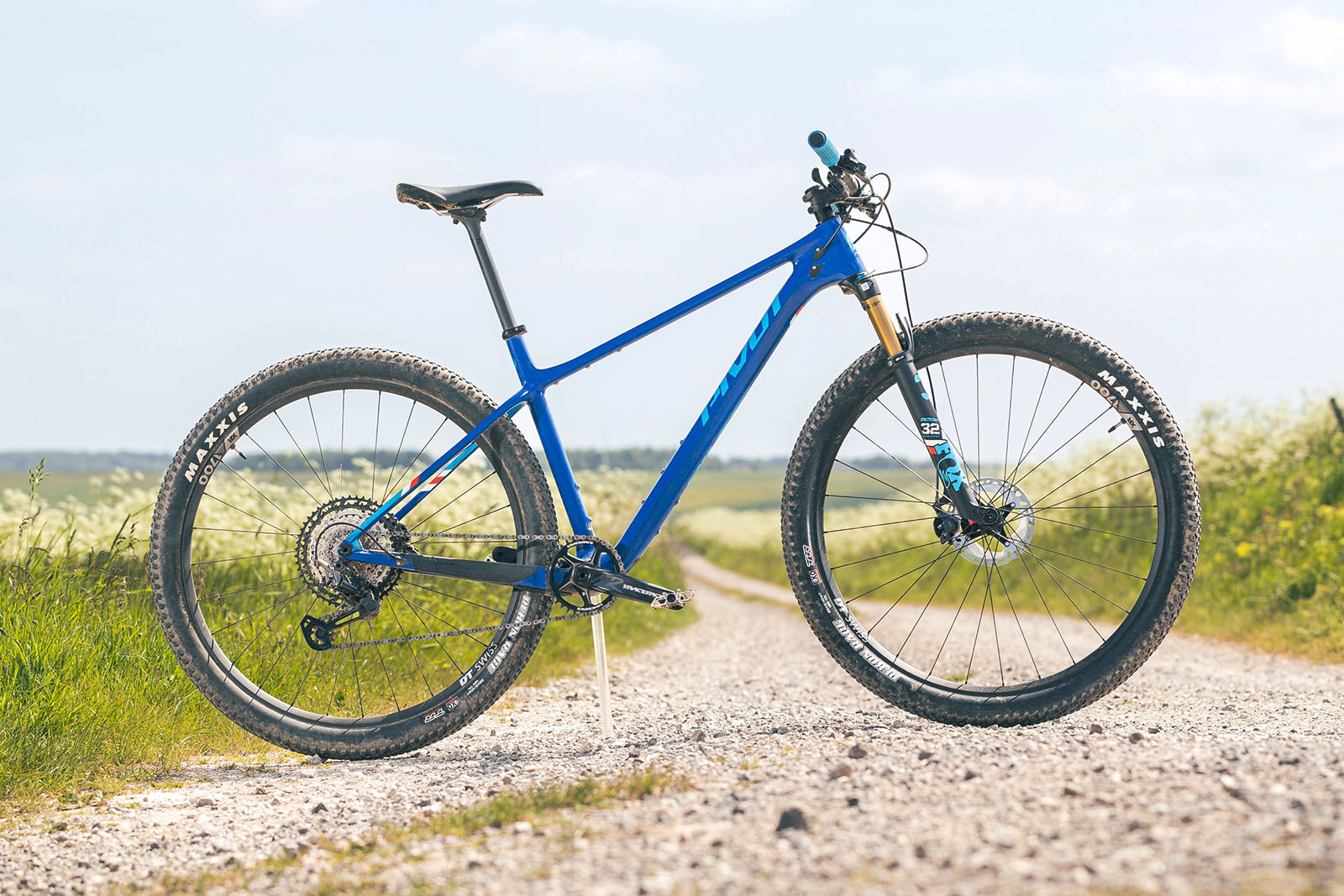
- £6,750 / $6,199 as tested
- Pros: Confidence-inspiring geometry; good grip without sacrificing speed; excellent fork
- Cons: Pricey; press-fit BB isn’t ideal for home mechanics
Pivot’s LES SL 29 Pro XT/XTR is the brand’s carbon fibre cross-country race hardtail, which is hinted at in the pun-based name of the bike.
The lateral compliance in the frame enables you to maintain a high speed over chattery terrain, while the geometry makes the bike nimble through the trees and efficient on hills.
While it’s expensive, the bike comes well specced with a combination of Shimano XT and XTR parts used in the groupset, alongside a 100mm Fox 32 Factory StepCast fork, though we’d have liked to have seen carbon wheels featuring at this price point.
Best hardtail mountain bikes under £2,000 / $2,300
Sonder Signal ST NX
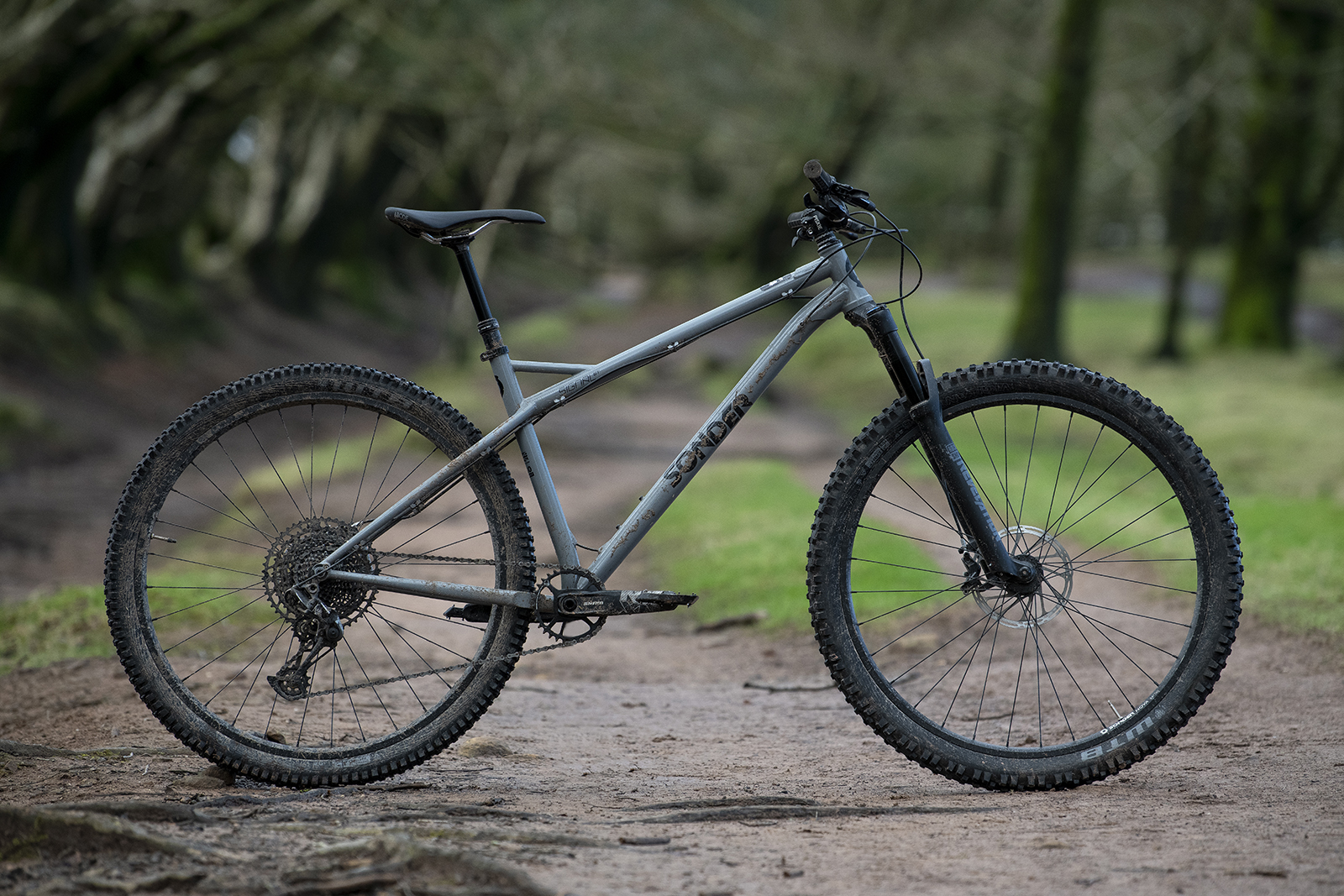
- £1,599 / $2,297 / €1,799 / AU$2,914
- Pros: Great geometry; decent tyres
- Cons: Short-travel dropper and small discs hold it back
The Sonder Signal ST NX is a steel hardtail that’s made to the British company’s principles of value for money and hard-charging, descent-focused bikes.
The Signal ticks all the modern aggressive trail bike boxes with a large reach, 66-degree head tube and 74-degree seat tube. Heading downhill, the bike pulls at the leash and rides across roots with ease.
This bike was never intended to be a fast climber, but it does spin comfortably uphill and is confident over technical inclines.
WTB tyres help the Signal find grip wherever possible and the 130mm RockShox Revelation RC fork is good in most circumstances. It would be nice to have a slightly longer dropper to create enough space to move your weight around in the sketchiest of situations.
Overall, the Signal has a great chassis that wouldn’t look out of place on a much pricier bike, and there is a good level of kit for the money without too much compromise.
Best hardtail mountain bikes under £1,500 / $1,700
Giant Fathom 29 2

- £1,399 / $1,500 / €1,299 as tested
- Pros: Good spec for the money; up-to-date geometry; dropper seatpost
- Cons: Modern geometry may see some riders needing to size down
The Fathom 29 2 impressed us with its well-considered component choices and Giant’s suspension fork.
This leads to a bike that feels comfortable and capable, even on trail-centre black routes, with the Maxxis tyres offering plenty of grip.
We found the sizing to be a little bigger than expected, so small riders may want to look into this before purchasing.
Kona Kahuna
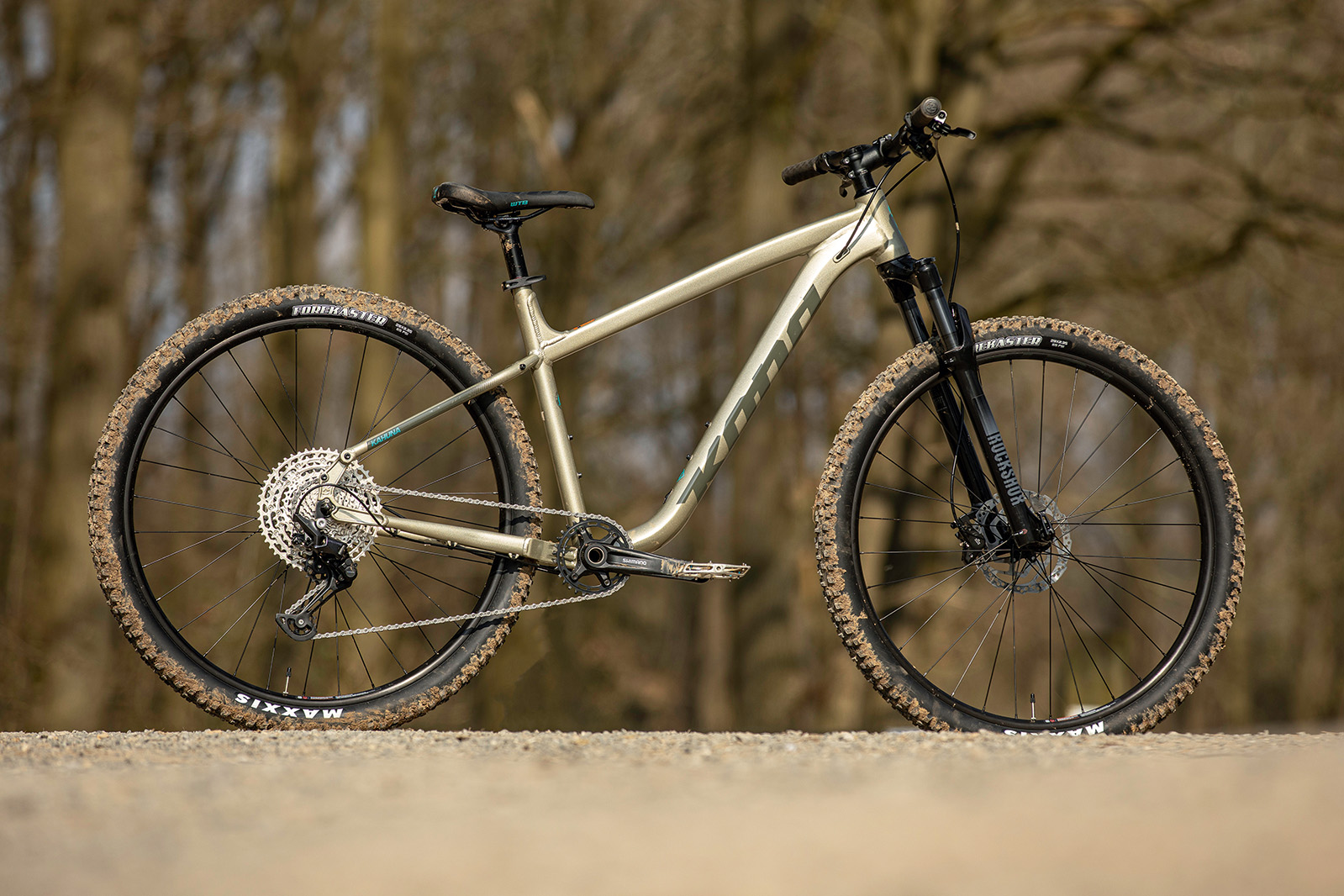
- £1,199 as tested
- Pros: Superb ride quality; well-specced Shimano groupset and brakes
- Cons: No dropper post
Kona’s endearing Kahuna offers a commendable ride quality in its latest guise. With a curvy shape and low-slung top tube, the cross-country frame offers a lively ride with instantaneous acceleration when you crank up the power on the pedals.
The Kahuna features a Shimano Deore 12-speed groupset, which is the best you can get for the asking price, as well as reliable Shimano MT410 hydraulic disc brakes.
What holds the bike back from a full 5-star rating is its more traditional geometry and its quick-release rear axle, which limits wheel-upgrade potential. The Kahuna also lacks a dropper seatpost, although the frame has the possible routing for one, should you wish to upgrade.
Merida Big.Trail 600

- £2,000 / €2,350 as tested
- Pros: Good versatility; reach-based sizing thanks to short seatstays
- Cons: Tyre could be wider; early models have long cranks
Merida’s Big.Trail 600 has a progressive frame with a short seat tube enabling you to pick a size that best suits your reach measurement.
We found the bike to be an efficient climber, with the seating position offering good comfort and the tyre choice adding good grip without sacrificing rolling resistance.
We would have liked wider rubber for added grip on the descents, but that’s not to say the tyres aren’t capable enough.
RockShox’s Pike fork impresses, and the Shimano gears and XT brakes make for a good all-round spec.
Whyte 529
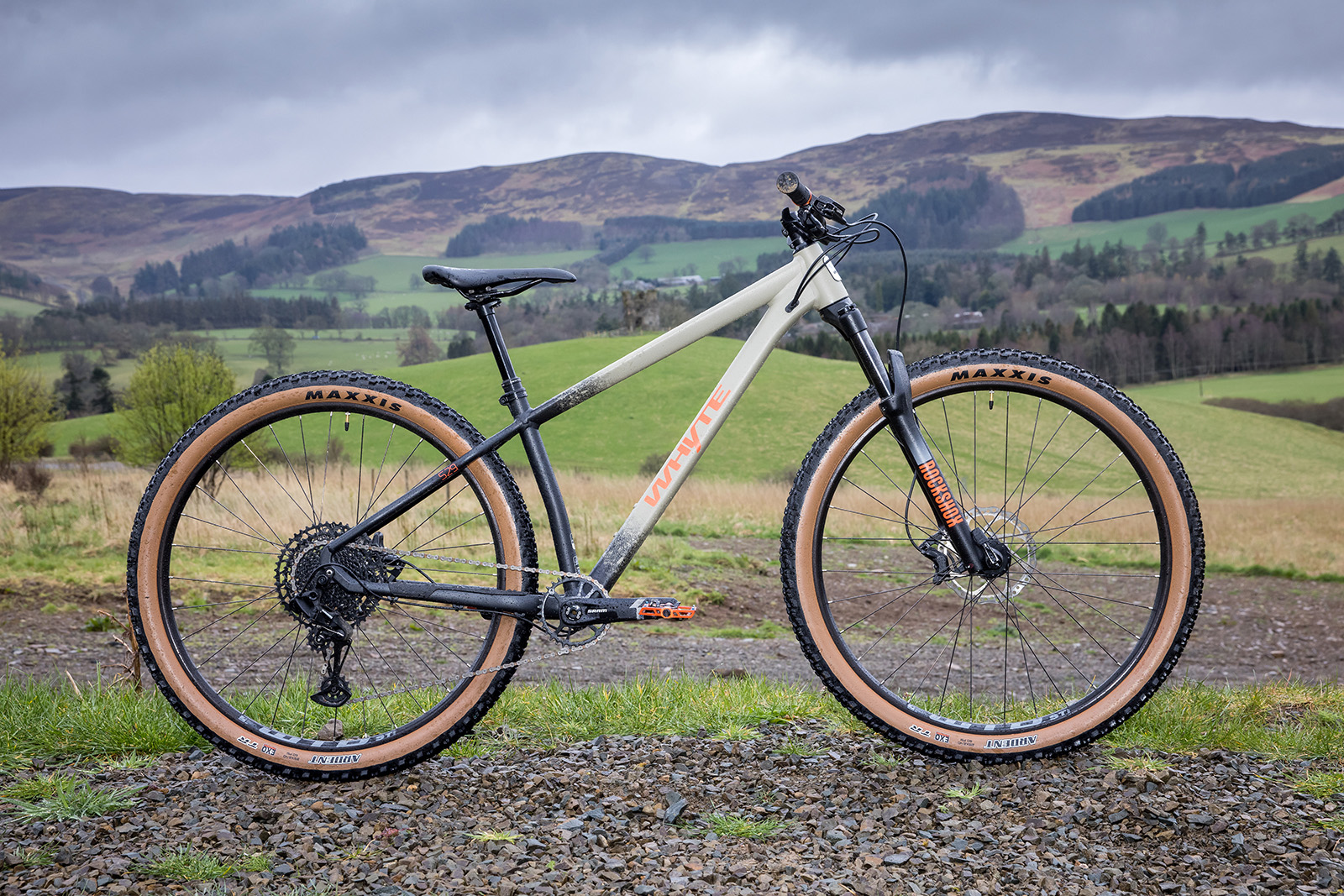
- £1,250 as tested
- Pros: Fun ride quality; good components; four-piston brakes
- Cons: Quite stretched-out when climbing
The 529 is a fun-loving hardtail with decent-focused geometry and components.
We found the bike performed well on a variety of trails, with trail-centre black trails within its remit.
A low bottom bracket makes the bike quick to turn, while a slack head angle adds confidence when going down steep shoots.
This hinders climbing performance, with our tester experiencing a stretched-out feeling when going uphill.
Best hardtail mountain bikes under £1,000/$1,200
Carrera Fury
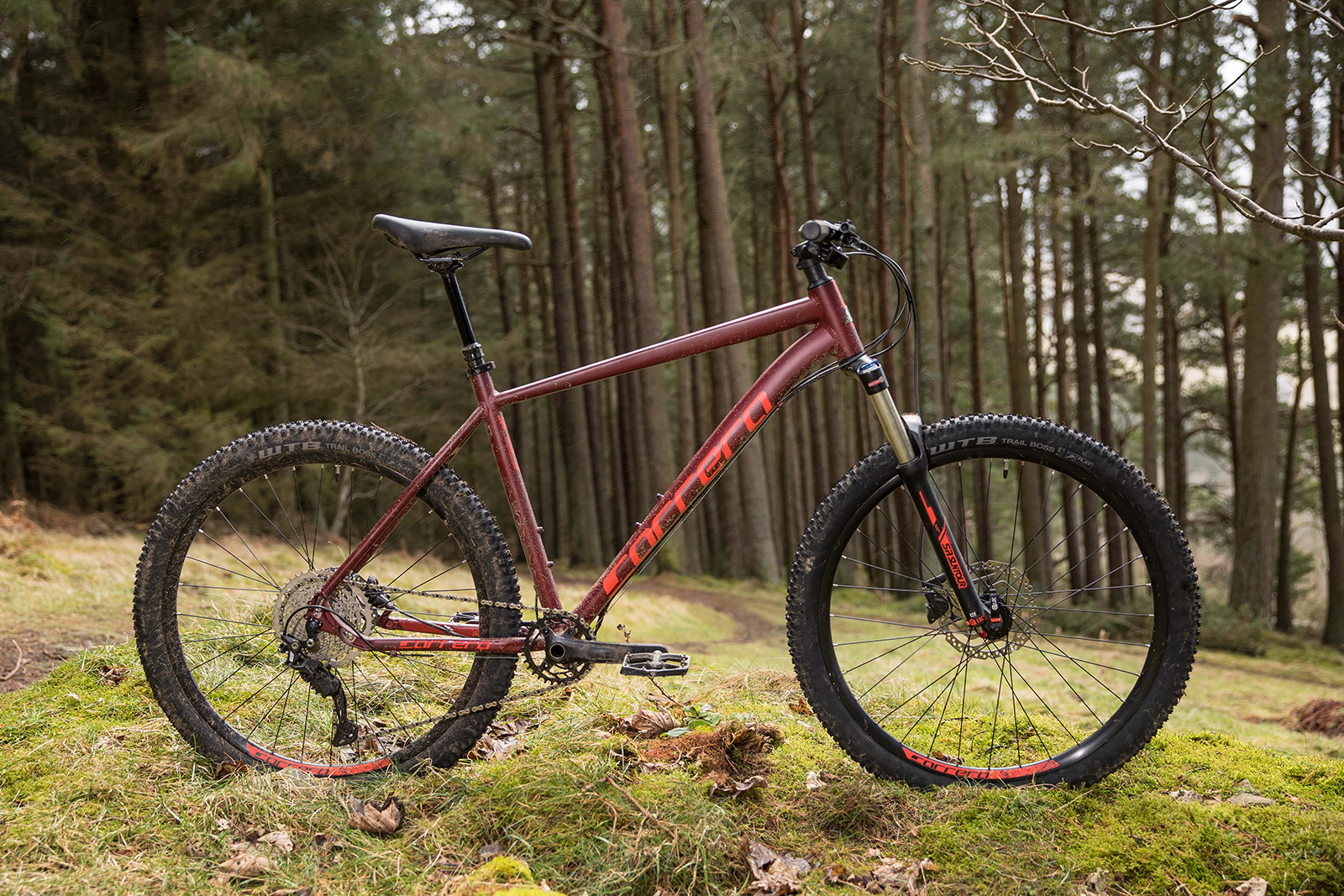
- £600 as tested
- Pros: Great value for money; comfortable on the hills; good geometry
- Cons: Front fork holds the bike back; non-Boost hub spacing limits wheel choice
With a dropper post, Shimano Deore drivetrain, WTB Trail Boss tyres and £600 price tag, the Carrera Fury is probably one of the best value-for-money mountain bikes out there.
The Fury can also lay claim to having a more progressive geometry than many of its competitors at this price point. This helps make it comfortable on climbs, and when paired with its 650b wheels it has a solid, stable feel and great descending composure.
We weren’t without quibbles when testing this bike, though. The air-sprung front fork doesn’t offer great small-bump sensitivity, and a fork upgrade isn’t viable at this price. It would be nice to see Boost spacing too.
Despite these points, you do get a lot of performance for the money and the Fury trumps its competitors in multiple ways. A better fork would just elevate this steal of a bike even further.
Rockrider AM 100

- £999 as tested
- Pros: Modern geometry; poppy and balanced handling; good value
- Cons: Dropper could be longer; can't be set up tubeless
Rockrider's AM 100 is our Budget Mountain Bike of the Year 2024.
The AM 100 has an up-to-date frame design that performs well on the downhill, while maintaining good ground-covering performance.
We struggled with rock strikes on our size-small bike with the BB height is a little low because it uses a 27.5in wheel on the rear.
Voodoo Bizango Pro

- £950 / $1,258 as tested
- Pros: High-quality spec for the price; good upgrade potential; lightweight
- Cons: Poor seat tube tolerance; high stack height
The Voodoo Bizango Pro offers top performance at a bargain price. The quality spec includes a RockShox FS-35 Gold 130mm fork, Shimano Deore 12-speed and Maxxis tyres helping to get the most out of the frame.
The Bizango Pro inspires plenty of confidence, with the bike feeling stable downhill and especially when railing berms thanks to it's progressive geometry and decent tyres. We even felt comfortable to push the it further than trail centre blues and reds, with it continuing to shine on more technical trails.
The 35mm stanchioned fork was easy to set up and performed well, giving the bike a solid feeling at the front end and allowing for open line choice through rockier sections.
Tolerances between the seat tube and seatpost are quite large, which leads to the saddle dropping on occasion, though this was solved with application of some carbon assembly paste.
Marin Bobcat Trail 5

- £985 / $999 / €1,149 as tested
- Pros: Well-considered spec; progressive geometry; comfortable ride
- Cons: Coil fork is harder to tune
The Bobcat Trail 5 is an excellent hardtail mountain bike that uses the Bobcat Trail frameset, and is built up with a 120mm Suntour XCR 32 fork and 1x11 Shimano Deore drivetrain.
The fork is coil-sprung, which made it difficult initially to set up the suspension. We found it to be less effective than air-sprung forks found on similarly priced bikes.
We were impressed by the bike's handling and the high levels of stability that the long-reach frame provided with its 67.5-degree head angle.
The aggressive geometry provides good confidence beyond the bike's intended use.
Specialized Rockhopper Elite 29

- £949 / $1,150 / €975 / AU$1,300 as tested
- Pros: Fast-rolling and quick up the hills; lightweight and well specced; fast-rolling tyres
- Cons: Short travel limits technical riding
The Rockhopper Elite 29 rolls fast and descends well thanks to 29in wheels and a solid spec choice.
A RockShox Judy Solo Air fork provides good support on the descents, with the short travel, which ranges from 80mm to 100mm depending on size, making for engaging an ride. However, there is more work to be done by the rider compared to other bikes with more suspension.
The 29in wheels help with line choice, and enable the bike to monster over the type technical sections that feature in trail centres.
Calibre Rake 29

- £700 (£550 with GO Outdoors membership card) as tested
- Pros: Impressive value for money; playful handling
- Cons: Quick-release wheels limit upgrades
The Calibre Rake 29 is incredibly well specced for the money, featuring components found on bikes twice its price.
A 100mm RockShox FS-Judy TK helps isolate you from rough trails, although there's some flex in the fork on hard compressions.
The Clarks M2 hydraulic disc brakes give the bike a controlled feel that enables you to tackle trail-centre descents with confidence.
A 66-degree head angle also helps in keeping the bike under control at high speed.
While the frame was quite stiff, the WTB Trail Boss tyres provided plenty of comfort and gave enough grip to comfortably push the bike.
Why you can trust BikeRadar
BikeRadar has been an authority on bikes and cycling tech since its inception in 2007, delivering the world’s best riding advice.
We have experts testing all types of bikes, parts, clothing and accessories, from road, mountain and gravel bikes to commuting, bikepacking and electric bikes.
Our reviews are always editorially independent – with no exceptions. Our reviewers comprehensively test all products in the real world, always reflecting on performance, value and the wider market when delivering their verdicts and review ratings.
We have more than 15,000 product reviews available at your fingertips, as well as expert buying, maintenance, training, skills, health and fitness advice.
Our annual Bike of the Year test is an industry benchmark and the BikeRadar team consists of some of the most experienced riders and testers in the business.
Buyer’s guide to hardtail mountain bikes
Hardtail vs full-suspension mountain bike
Stuck between whether a hardtail or full-suspension mountain bike best suits your requirements?
It all depends on the type of mountain biking you would like to take part in. Hardtails are more capable than you might initially think, but full-suspension mountain bikes come into their own on more technical terrain, especially when the gradients point downwards.
Budget is the biggest factor and (with few exceptions), the entry point to a full-suspension bike is much higher than that for a hardtail. The best mountain bikes under £1,500 see full-suspension start to become available and as you start to spend more, you'll find updates in frame materials, as well as better components and suspension specced.
What is a hardtail mountain bike bike best for?

It is possible to ride any discipline on a hardtail, with cross-country, trail and enduro all catered for by manufacturers.
Hardtail mountain bikes have long been a favourite of cross-country riders for their direct pedalling efficiency and lighter weight when compared to full-suspension bikes.
Hardtails also cover the trail and enduro categories, with some featuring super-slack geometry to accommodate 170mm forks.
Many riders choose to ride hardtails for their mechanical simplicity, which can require a more involved and skilful riding experience
Hardtail mountain bikes usually dominate the lower end of the market and can be a great way of getting onto the trails if you don’t want to splash out for a full-suspension model.
Hardtail mountain bikes vs full-suspension mountain bikes
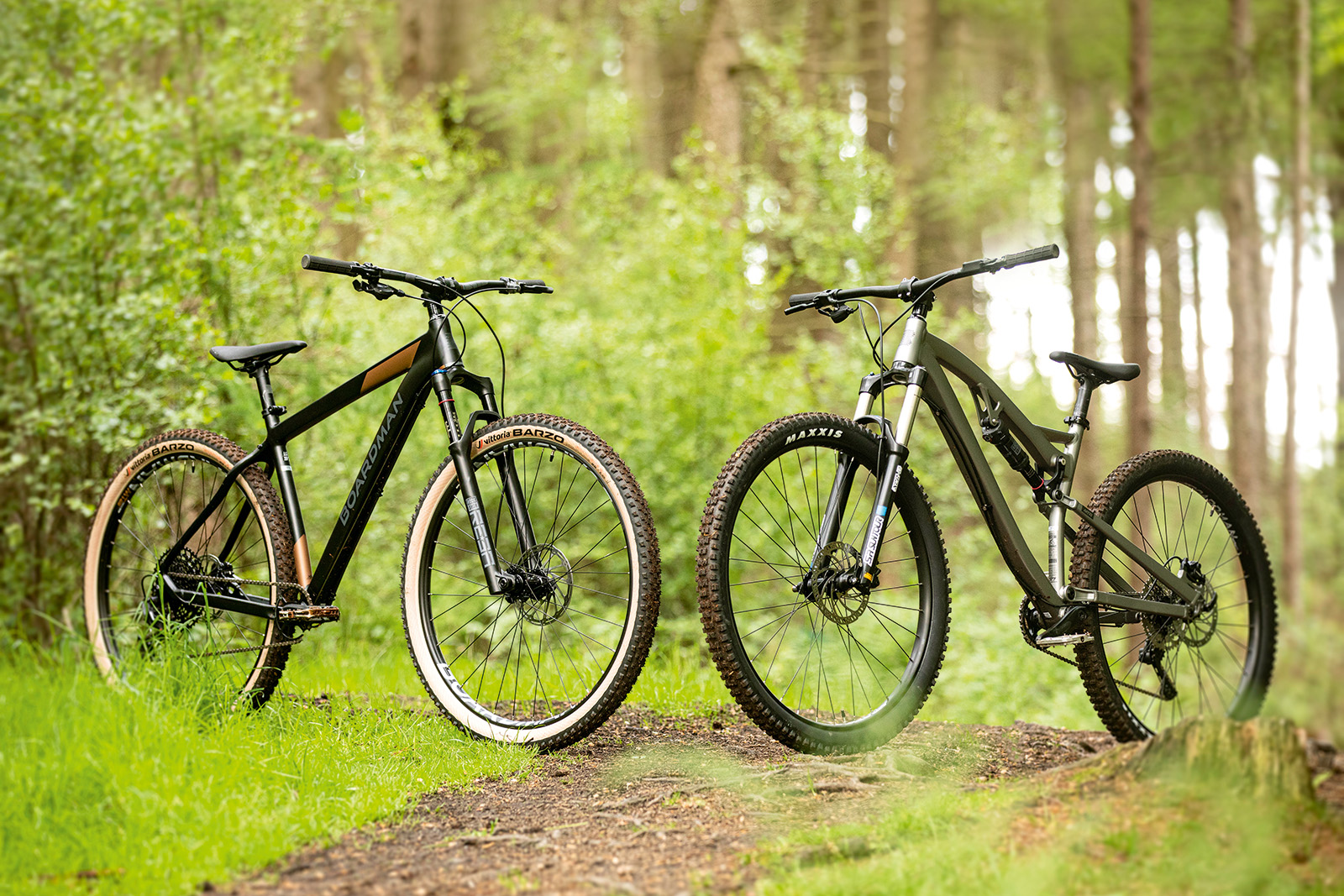
Hardtail mountain bikes are much simpler than full-suspension bikes, with only a suspension fork and tyres providing any damping from the trail below.
Full-suspension bikes feel more isolated from the trail, which can reduce rider fatigue and enable a more brazen riding style because the suspension will help save you from poor line choices.
While full-suspension bikes are more capable on rough technical descents, they require more moving parts, such as a linkage and rear shock. These cost more and need regular servicing.
This also makes them heavier than hardtails, which can mean they're less fun to pedal. Full-suspenion bikes will give you better traction on rough terrain though.
Some hardtail mountain bikes feature flexible zones in the frame that allow for vertical compliance to reduce vibrations and provide more grip.
What components should I look for on a hardtail mountain bike?
Tyres and wheels
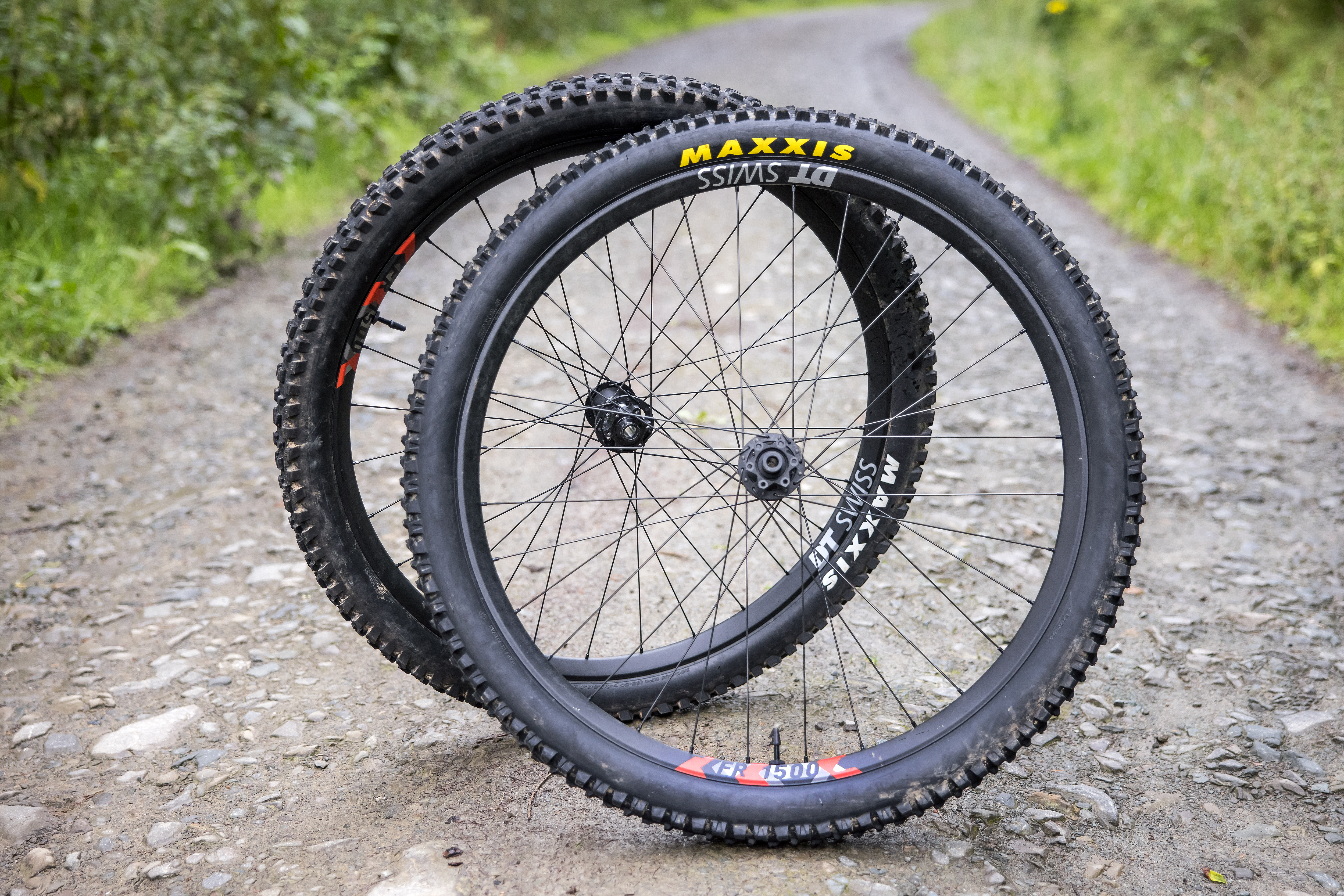
Because hardtails have less mechanical suspension, tyre and wheel choice is even more important.
Wider mountain bike tyres will enable you to run your tyre pressures lower, especially if you have your bike set up tubeless.
The best mountain bike wheels will feature wide internal rims. These provide tyres with a confidence-boosting wide stance and increased volume.
Fork

The fork is also important because it provides your only damped suspension.
Wider stanchions add weight but provide increased rigidity, improving control for trail riding. Lightweight cross-country forks will often feature narrower stanchions that feel more flexible in high-compression corners.
Check out our buyer's guide to mountain bike forks for more information.
Dropper post

A dropper post is always a good addition, especially on a hardtail because it enables you to move your weight more freely over the back wheel to find a grip.
What is the best wheel size for a hardtail mountain bike?
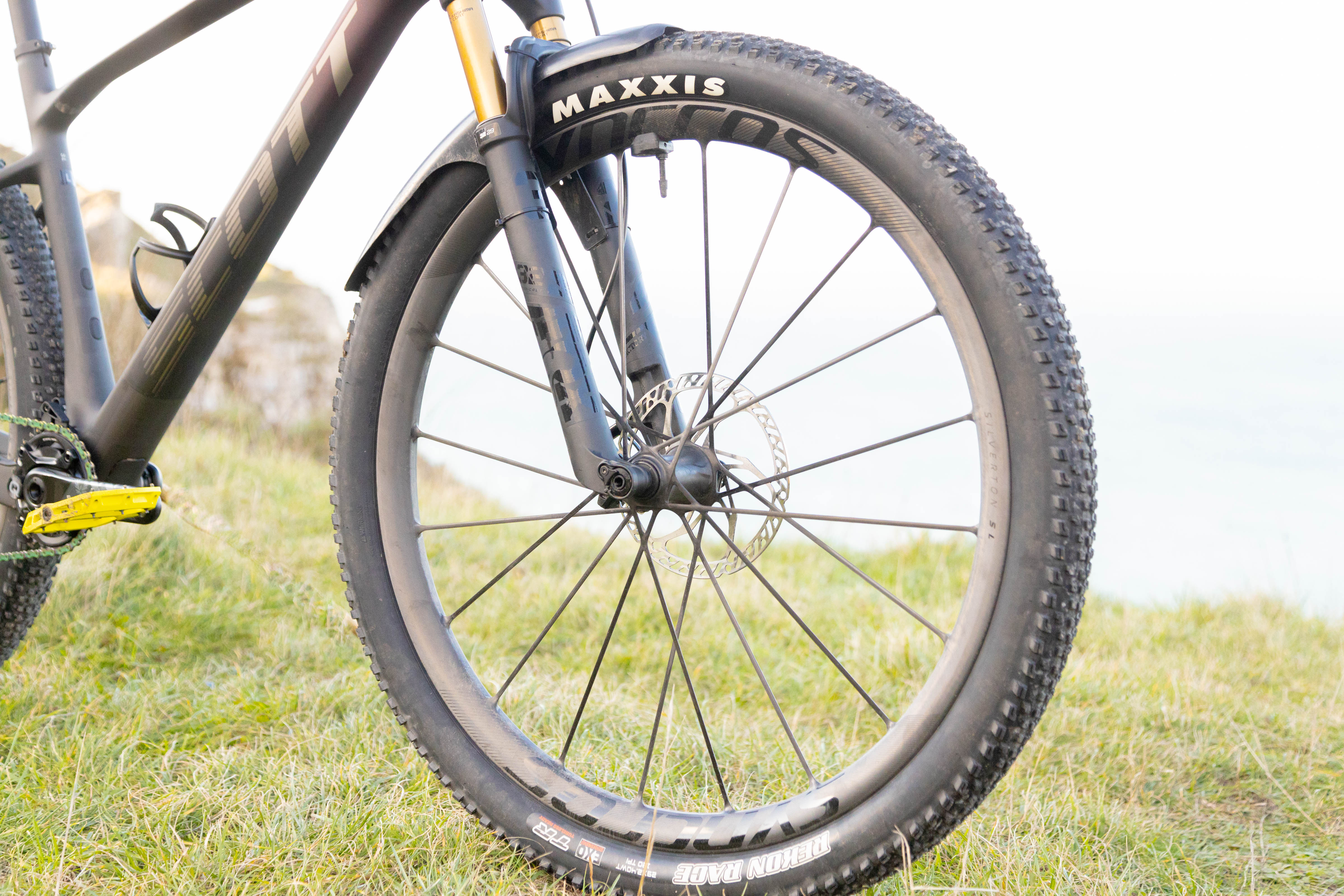
Because hardtail mountain bikes have less suspension than full-suspension bikes, they're affected more by rocks and bumps in the trail.
29in wheels roll over objects easier than 27.5in wheels due to their increased size. This makes them a popular choice for all hardtail riders, from cross-country to enduro.
A smaller wheel size may be desired if you are looking for a more playful bike, but there will be trade-offs in speed and damping.
Hardtail mountain bike geometry

Hardtail mountain bike geometry varies depending on discipline, with bikes designed for more gravity-fed riding featuring long, low and slack geometry just like their full-suspension counterparts.
Hardtails usually feature a sloping top tube, which keeps the weight of the bike lower which helps to keep it more stable.
It also makes it easier to move around the bike, because there’s no horizontal head tube in your way, and improves seated comfort because more seatpost is exposed, which adds compliance.
Without the room needed for a linkage, chainstay lengths can be made much smaller than full-suspension bikes, giving hardtails a more playful and responsive ride.
Cross-country hardtails will usually feature steep seat tube angles to centre your weight over the pedals for uphill efforts, and a long front centre for a more stretched-out riding style.
How much should I spend on a hardtail mountain bike?

Hardtails are known for their affordable price tags – most entry-level mountain bikes worth consideration are hardtails.
However, as our best list shows, there are hardtails in every price range – how much you spend is really determined by how much you’re willing to pay, and what you are looking for.
Hardtail mountain bikes aren’t necessarily cheaper than full-suspension bikes, with high-end cross-country hardtails being priced very similarly to their full-suspension counterparts.
At this end of the market, you can expect to see drool-worthy components on ridiculously light frames.
Decent hardtails start from £500, with bikes at this price point usually featuring trail-ready geometry and components.
What's your budget?
It's no surprise that hardtails dominate our buyer's guides to the best mountain bikes under £500, best mountain bikes under £750 and best mountain bikes under £1,000, but they're not always the best option for every rider.
If you're in the market for a full-suspension bike, make sure you check out our guides to the best trail bikes, best downcountry bikes and best enduro mountain bikes.
We've also got a list of the best cross-country bikes, covering both hardtail and full-suspension designs for XC racing. You may also be interested in our round-up of the best electric mountain bikes.
Still unsure? Head to our guide on how to choose the best mountain bike for you, with the pros and cons of each category.